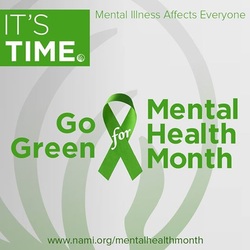 Did you know that 1 in 4 American adults experiences mental illness every year? Or that 20% of children ages 13 to 18 experience mental health problems in any given year? (National Alliance on Mental Illness) May has been designated “Mental Health Awareness Month” in order to bring awareness to mental illness in America. In my years as a social worker, I have heard many people speak about mental illness as something to be kept secret. Some people are ashamed that they are not well and hesitate to seek help as a result. In honor of Mental Health Awareness Month, I will be discussing 5 myths about mental illness and seeking mental health care. I will also include a bonus post about self-care. This is the first of a 4 part series to be posted throughout the remainder of May. My goal is to help you better understand mental illness and mental health treatment, as well as to offer some ideas on how to get help if necessary. Please share with anyone who might benefit from this information! Here are the topics I will cover over the next 10 days:
Let's get started. Myth #1: Mental illness means I am crazy and will always be crazy. Not so. Crazy is a word often applied with little concern or compassion for those experiencing mental illness. I do not believe having any sort of mental illness makes you "crazy." I believe it means you are facing a challenge that can be managed and often overcome with time, patience, hard work, support and professional help. My challenge to all of my readers is to watch your language. No, I'm not talking about swearing or anything along those lines. What I am asking is that you observe how often you use the word "crazy" to describe someone. Unfortunately, it has become socially acceptable to label someone behaving in an odd or out of control manner as being "crazy" rather than acknowledging they may be dealing with mental illness. Let's change this bad habit and practice acceptance instead. Learn more by reading the rest of the series! Mental Health Awareness Month: Myths and Facts, Part 2 Mental Health Awareness Month: Myths and Facts, Part 3 Mental Health Awareness Month: Bonus Post! Bethany Raab is a Licensed Clinical Social Worker in Denver, Colorado.
 Thanksgiving is upon us and I wanted to offer a few thoughts on the benefits experienced by teens who express gratitude. 1) Increased happiness and overall well-being A research study by the American Psychological Association found that teens, like adults, experience a variety of benefits from the act of gratitude. The author of numerous studies about gratitude, Giacomo Bono, PhD, psychology professor at California State University, had this to say about the benefits of gratitude in high school aged teens: “Increases in gratitude over a four-year period were significantly related to improvements in life satisfaction, happiness, positive attitudes and hope.” According to the Harvard Medical School, “gratitude is strongly and consistently associated with greater happiness. Gratitude helps people feel more positive emotions, relish good experiences, improve their health, deal with adversity, and build strong relationships.” 2) Lower occurrence of depression symptoms Teens who express gratitude on a regular basis typically report fewer symptoms of depression. Giacomo Bono, PhD, suggests this is a result of being connected and reminded of the good aspects of one’s life. "People who are grateful are more optimistic and hopeful, feeling they have the resources to be successful in their future," said Bono. Click here for more information. The same goes for adults: researchers at York University in Toronto found that depressed study participants who completed a “gratitude exercise” every night, were less depressed six months after the study was complete. 3) Greater contributions to society According to a 2010 study of gratitude in teens by Froh, Bono & Emmons, "gratitude ignites a passion for helping others and contributing to society." The study indicates teens that are grateful tend to be more connected to their communities and want to give back, both as teens and later as adults. So how can you reap the benefits of gratitude? Here are some ideas:
Happy Thanksgiving! Photo from Flickr. Some rights reserved by woodleywonderworks. Bethany Jones Raab is a Licensed Clinical Social Worker in Denver, Colorado.
I have noticed a recent increase in conversations on social media regarding parents' choice to vaccinate their children and concerns that vaccinations can cause autism. Specifically, a 2011 NPR article titled Study Linking Childhood Vaccine And Autism Was Fraudulent has resurfaced, sparking fervent discussion about vaccinations. Dr. Andrew Wakefield, a British physician, and his colleagues published studies in 1998 and 2002 linking the measles, mumps and rubella (MMR) vaccine to autism. The studies were published in The Lancet which is self-described as "the world's leading general medical journal and specialty journals in Oncology, Neurology and Infectious Diseases." The publication officially retracted the studies in 2010 after discovering that the studies were fraudulent. See this NPR article which links to the official retraction from The Lancet. Click here for an article from the American Academy of Pediatrics outlining the original Wakefield studies and the specific flaws of each. I am interested in hearing from my readers on this topic. Here are some specific questions to get the discussion started:
Please comment with your thoughts! *The author of this article is not a medical professional and is not authorized to provide medical advice. The purpose of this article is to encourage discussion on the decision-making process used by the public to determine whether or not to vaccinate children. No medical advice will be given in response to comments. Please contact your doctor with specific medical concerns about vaccines, autism and/or the health of your children. Bethany Jones Raab is a Licensed Clinical Social Worker in Denver, Colorado.
|
Welcome!
Every blog post you see on this page is written especially for teens and their parents! Like it? Pin it!
Follow me!
Categories
All
|

 RSS Feed
RSS Feed